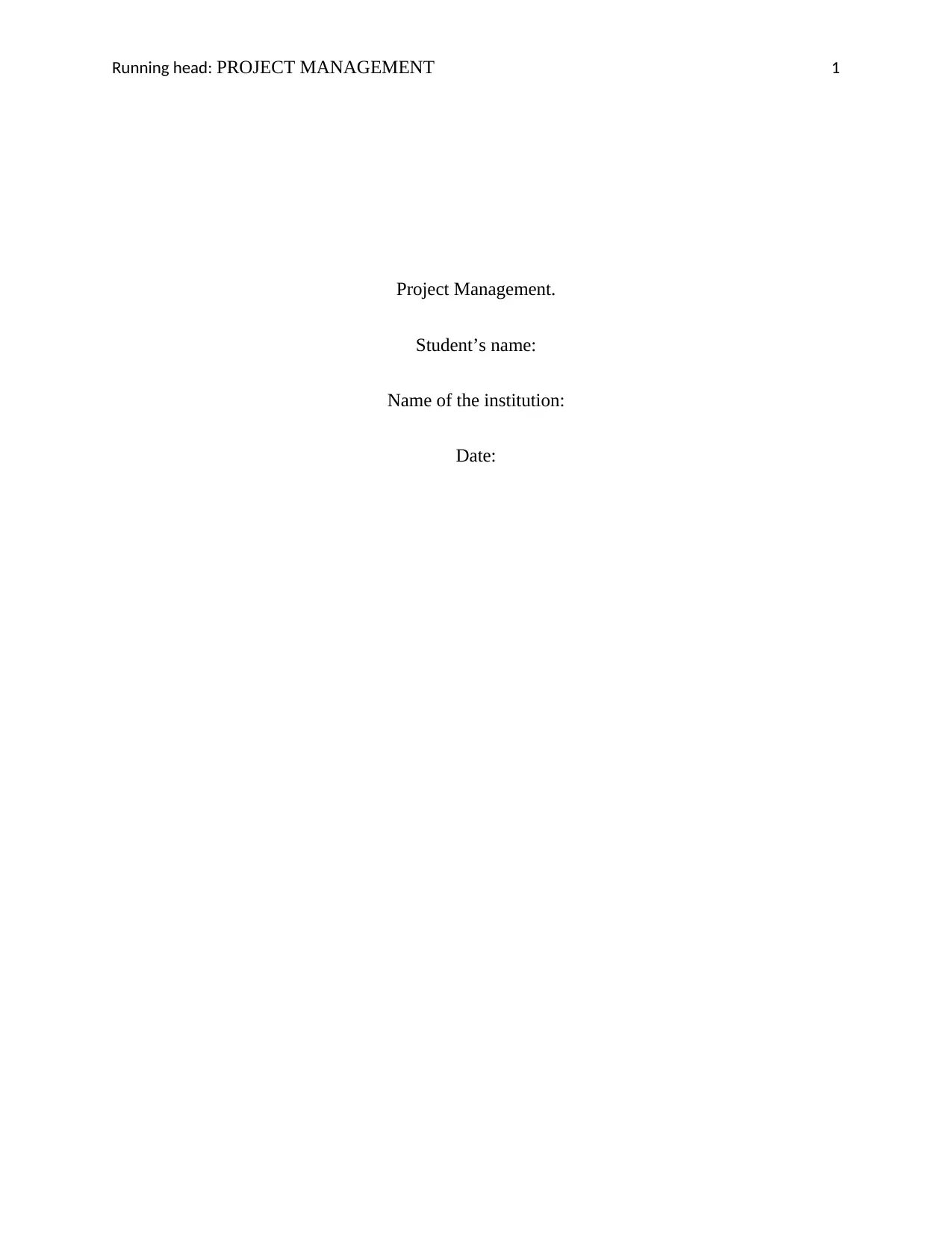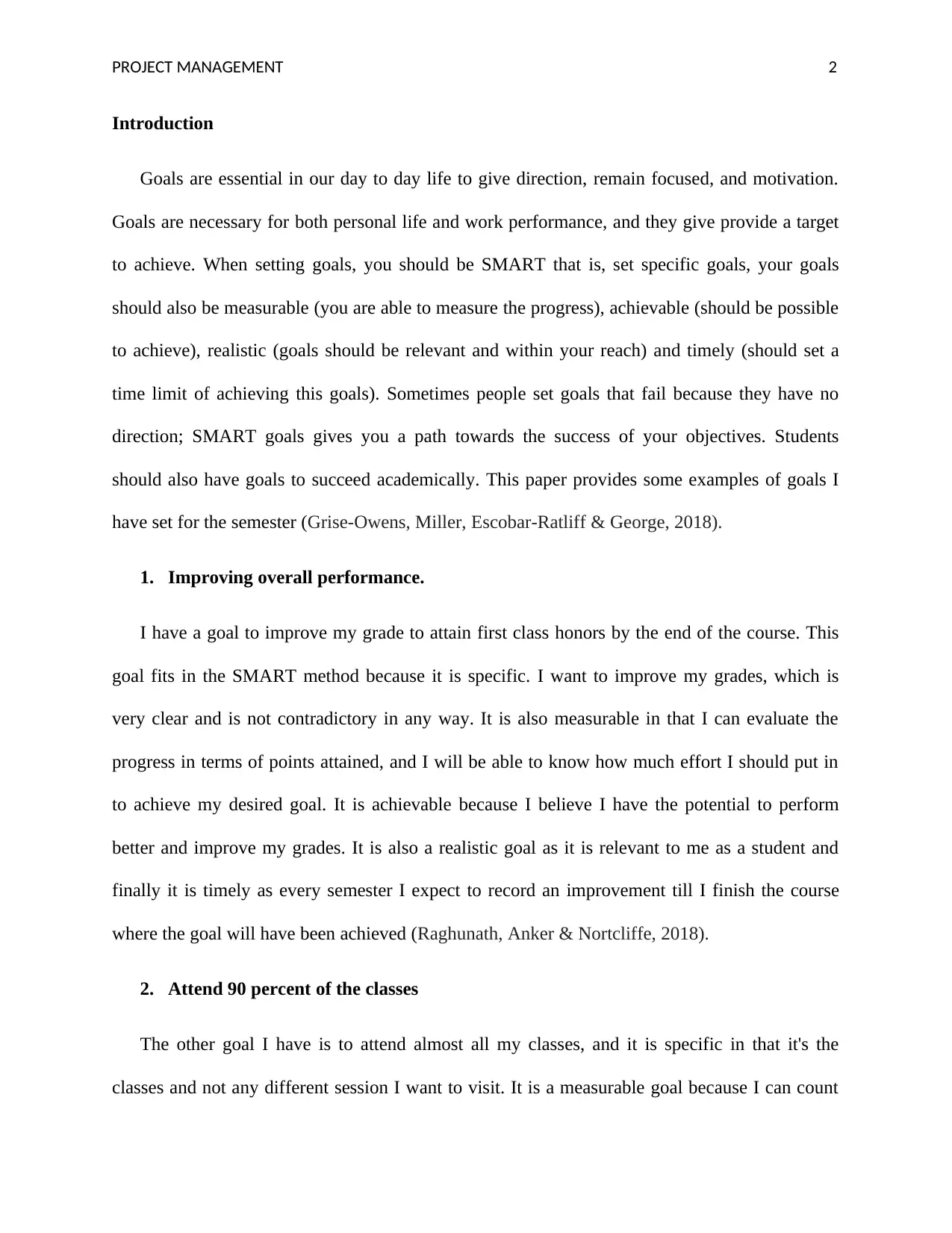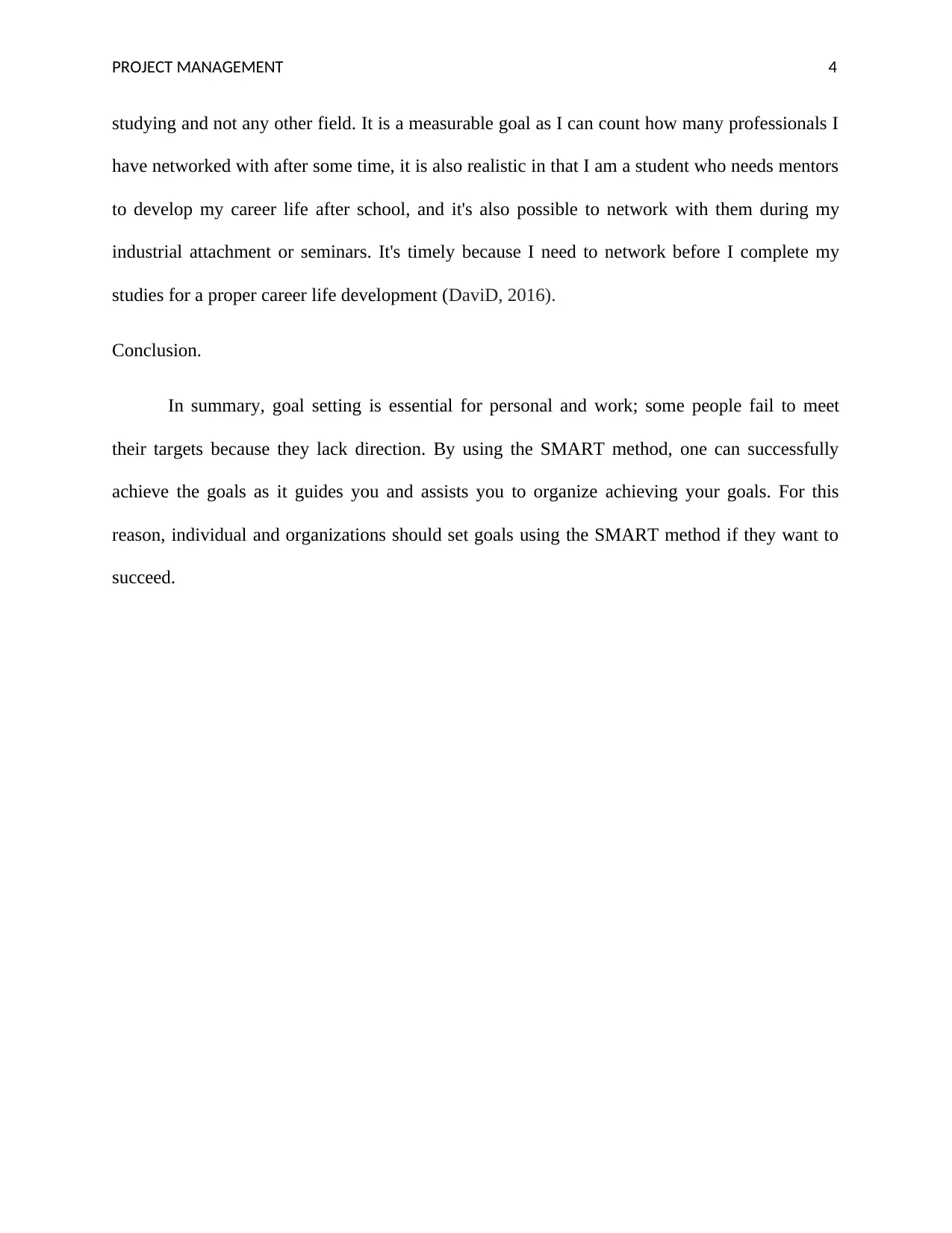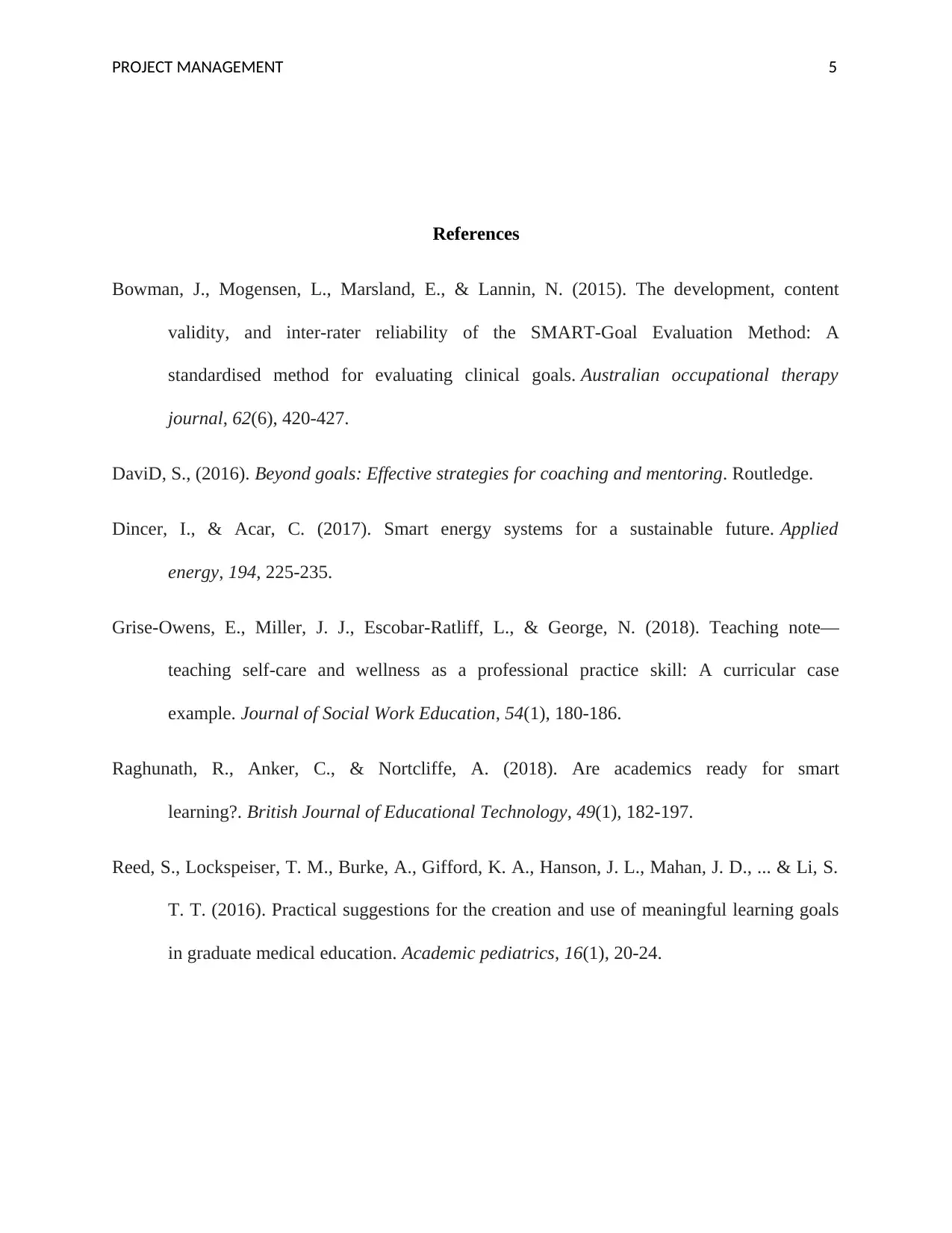Project Management: SMART Goals for Academic and Personal Growth
VerifiedAdded on 2023/03/31
|5
|998
|199
Homework Assignment
AI Summary
This assignment focuses on project management and the application of the SMART goal-setting method for academic and personal development. The student identifies five key goals: improving overall performance to achieve first-class honors, attending a high percentage of classes, participating in co-curricular activities, practicing financial accountability, and networking with professionals in their field of study. Each goal is analyzed to demonstrate its alignment with the SMART criteria: Specific, Measurable, Achievable, Realistic, and Timely. The paper emphasizes the importance of goal setting in providing direction, focus, and motivation, highlighting how the SMART method can guide individuals and organizations toward successful goal achievement. The student provides a clear and practical framework for setting and achieving objectives, emphasizing the importance of organized planning and execution.

Running head: PROJECT MANAGEMENT 1
Project Management.
Student’s name:
Name of the institution:
Date:
Project Management.
Student’s name:
Name of the institution:
Date:
Paraphrase This Document
Need a fresh take? Get an instant paraphrase of this document with our AI Paraphraser

PROJECT MANAGEMENT 2
Introduction
Goals are essential in our day to day life to give direction, remain focused, and motivation.
Goals are necessary for both personal life and work performance, and they give provide a target
to achieve. When setting goals, you should be SMART that is, set specific goals, your goals
should also be measurable (you are able to measure the progress), achievable (should be possible
to achieve), realistic (goals should be relevant and within your reach) and timely (should set a
time limit of achieving this goals). Sometimes people set goals that fail because they have no
direction; SMART goals gives you a path towards the success of your objectives. Students
should also have goals to succeed academically. This paper provides some examples of goals I
have set for the semester (Grise-Owens, Miller, Escobar-Ratliff & George, 2018).
1. Improving overall performance.
I have a goal to improve my grade to attain first class honors by the end of the course. This
goal fits in the SMART method because it is specific. I want to improve my grades, which is
very clear and is not contradictory in any way. It is also measurable in that I can evaluate the
progress in terms of points attained, and I will be able to know how much effort I should put in
to achieve my desired goal. It is achievable because I believe I have the potential to perform
better and improve my grades. It is also a realistic goal as it is relevant to me as a student and
finally it is timely as every semester I expect to record an improvement till I finish the course
where the goal will have been achieved (Raghunath, Anker & Nortcliffe, 2018).
2. Attend 90 percent of the classes
The other goal I have is to attend almost all my classes, and it is specific in that it's the
classes and not any different session I want to visit. It is a measurable goal because I can count
Introduction
Goals are essential in our day to day life to give direction, remain focused, and motivation.
Goals are necessary for both personal life and work performance, and they give provide a target
to achieve. When setting goals, you should be SMART that is, set specific goals, your goals
should also be measurable (you are able to measure the progress), achievable (should be possible
to achieve), realistic (goals should be relevant and within your reach) and timely (should set a
time limit of achieving this goals). Sometimes people set goals that fail because they have no
direction; SMART goals gives you a path towards the success of your objectives. Students
should also have goals to succeed academically. This paper provides some examples of goals I
have set for the semester (Grise-Owens, Miller, Escobar-Ratliff & George, 2018).
1. Improving overall performance.
I have a goal to improve my grade to attain first class honors by the end of the course. This
goal fits in the SMART method because it is specific. I want to improve my grades, which is
very clear and is not contradictory in any way. It is also measurable in that I can evaluate the
progress in terms of points attained, and I will be able to know how much effort I should put in
to achieve my desired goal. It is achievable because I believe I have the potential to perform
better and improve my grades. It is also a realistic goal as it is relevant to me as a student and
finally it is timely as every semester I expect to record an improvement till I finish the course
where the goal will have been achieved (Raghunath, Anker & Nortcliffe, 2018).
2. Attend 90 percent of the classes
The other goal I have is to attend almost all my classes, and it is specific in that it's the
classes and not any different session I want to visit. It is a measurable goal because I can count

PROJECT MANAGEMENT 3
and the number of classes I have attended see if there is any improvement in the class attendance,
it is also an achievable goal because I can attend to all classes through internal motivation. The
goal is realistic to me because I am a student who requires to attend all lectures, it is time bound
in that it’s only essential until completion of my course (Bowman, Mogensen, Marsland &
Lannin, 2015).
3. Participate in three co-curricular activities in the school
This goal is clear about the co-curricular activities I want to join, it is specifically those in the
school and not from outside. The goals are also measurable as I can count the number of events
being involved in and how many more to join to achieve my goals, it is as well achievable as I
am a healthy and not too busy student for this activities. This goal is also realistic because I am a
member of the school and I can join any club and timely because I can only be a participant of
this activities till graduation (Dincer & Acar 2017).
4. Financial Accountability
Financial accountability is a clear goal, in that I want to manage my finances to spend within
my income and to avoid overspending while I am still a student. It is measurable because I can
count the money I have used to pay all bills and the amount I have saved, it an achievable goal
because I only have to budget and remain financially disciplined to achieve my goal. It is
realistic because as a student I need to spend money I get from my sponsors wisely and it is
timely as it is terminated at the end of the course (Reed et al. 2016).
5. Networking with many professions from my field of study.
The other goal I have is to network with professionals from my field of study. The goals is
specific, it is evident in that I specifically want to network with professionals in the area I am
and the number of classes I have attended see if there is any improvement in the class attendance,
it is also an achievable goal because I can attend to all classes through internal motivation. The
goal is realistic to me because I am a student who requires to attend all lectures, it is time bound
in that it’s only essential until completion of my course (Bowman, Mogensen, Marsland &
Lannin, 2015).
3. Participate in three co-curricular activities in the school
This goal is clear about the co-curricular activities I want to join, it is specifically those in the
school and not from outside. The goals are also measurable as I can count the number of events
being involved in and how many more to join to achieve my goals, it is as well achievable as I
am a healthy and not too busy student for this activities. This goal is also realistic because I am a
member of the school and I can join any club and timely because I can only be a participant of
this activities till graduation (Dincer & Acar 2017).
4. Financial Accountability
Financial accountability is a clear goal, in that I want to manage my finances to spend within
my income and to avoid overspending while I am still a student. It is measurable because I can
count the money I have used to pay all bills and the amount I have saved, it an achievable goal
because I only have to budget and remain financially disciplined to achieve my goal. It is
realistic because as a student I need to spend money I get from my sponsors wisely and it is
timely as it is terminated at the end of the course (Reed et al. 2016).
5. Networking with many professions from my field of study.
The other goal I have is to network with professionals from my field of study. The goals is
specific, it is evident in that I specifically want to network with professionals in the area I am
⊘ This is a preview!⊘
Do you want full access?
Subscribe today to unlock all pages.

Trusted by 1+ million students worldwide

PROJECT MANAGEMENT 4
studying and not any other field. It is a measurable goal as I can count how many professionals I
have networked with after some time, it is also realistic in that I am a student who needs mentors
to develop my career life after school, and it's also possible to network with them during my
industrial attachment or seminars. It's timely because I need to network before I complete my
studies for a proper career life development (DaviD, 2016).
Conclusion.
In summary, goal setting is essential for personal and work; some people fail to meet
their targets because they lack direction. By using the SMART method, one can successfully
achieve the goals as it guides you and assists you to organize achieving your goals. For this
reason, individual and organizations should set goals using the SMART method if they want to
succeed.
studying and not any other field. It is a measurable goal as I can count how many professionals I
have networked with after some time, it is also realistic in that I am a student who needs mentors
to develop my career life after school, and it's also possible to network with them during my
industrial attachment or seminars. It's timely because I need to network before I complete my
studies for a proper career life development (DaviD, 2016).
Conclusion.
In summary, goal setting is essential for personal and work; some people fail to meet
their targets because they lack direction. By using the SMART method, one can successfully
achieve the goals as it guides you and assists you to organize achieving your goals. For this
reason, individual and organizations should set goals using the SMART method if they want to
succeed.
Paraphrase This Document
Need a fresh take? Get an instant paraphrase of this document with our AI Paraphraser

PROJECT MANAGEMENT 5
References
Bowman, J., Mogensen, L., Marsland, E., & Lannin, N. (2015). The development, content
validity, and inter‐rater reliability of the SMART‐Goal Evaluation Method: A
standardised method for evaluating clinical goals. Australian occupational therapy
journal, 62(6), 420-427.
DaviD, S., (2016). Beyond goals: Effective strategies for coaching and mentoring. Routledge.
Dincer, I., & Acar, C. (2017). Smart energy systems for a sustainable future. Applied
energy, 194, 225-235.
Grise-Owens, E., Miller, J. J., Escobar-Ratliff, L., & George, N. (2018). Teaching note—
teaching self-care and wellness as a professional practice skill: A curricular case
example. Journal of Social Work Education, 54(1), 180-186.
Raghunath, R., Anker, C., & Nortcliffe, A. (2018). Are academics ready for smart
learning?. British Journal of Educational Technology, 49(1), 182-197.
Reed, S., Lockspeiser, T. M., Burke, A., Gifford, K. A., Hanson, J. L., Mahan, J. D., ... & Li, S.
T. T. (2016). Practical suggestions for the creation and use of meaningful learning goals
in graduate medical education. Academic pediatrics, 16(1), 20-24.
References
Bowman, J., Mogensen, L., Marsland, E., & Lannin, N. (2015). The development, content
validity, and inter‐rater reliability of the SMART‐Goal Evaluation Method: A
standardised method for evaluating clinical goals. Australian occupational therapy
journal, 62(6), 420-427.
DaviD, S., (2016). Beyond goals: Effective strategies for coaching and mentoring. Routledge.
Dincer, I., & Acar, C. (2017). Smart energy systems for a sustainable future. Applied
energy, 194, 225-235.
Grise-Owens, E., Miller, J. J., Escobar-Ratliff, L., & George, N. (2018). Teaching note—
teaching self-care and wellness as a professional practice skill: A curricular case
example. Journal of Social Work Education, 54(1), 180-186.
Raghunath, R., Anker, C., & Nortcliffe, A. (2018). Are academics ready for smart
learning?. British Journal of Educational Technology, 49(1), 182-197.
Reed, S., Lockspeiser, T. M., Burke, A., Gifford, K. A., Hanson, J. L., Mahan, J. D., ... & Li, S.
T. T. (2016). Practical suggestions for the creation and use of meaningful learning goals
in graduate medical education. Academic pediatrics, 16(1), 20-24.
1 out of 5
Related Documents
Your All-in-One AI-Powered Toolkit for Academic Success.
+13062052269
info@desklib.com
Available 24*7 on WhatsApp / Email
![[object Object]](/_next/static/media/star-bottom.7253800d.svg)
Unlock your academic potential
Copyright © 2020–2026 A2Z Services. All Rights Reserved. Developed and managed by ZUCOL.





